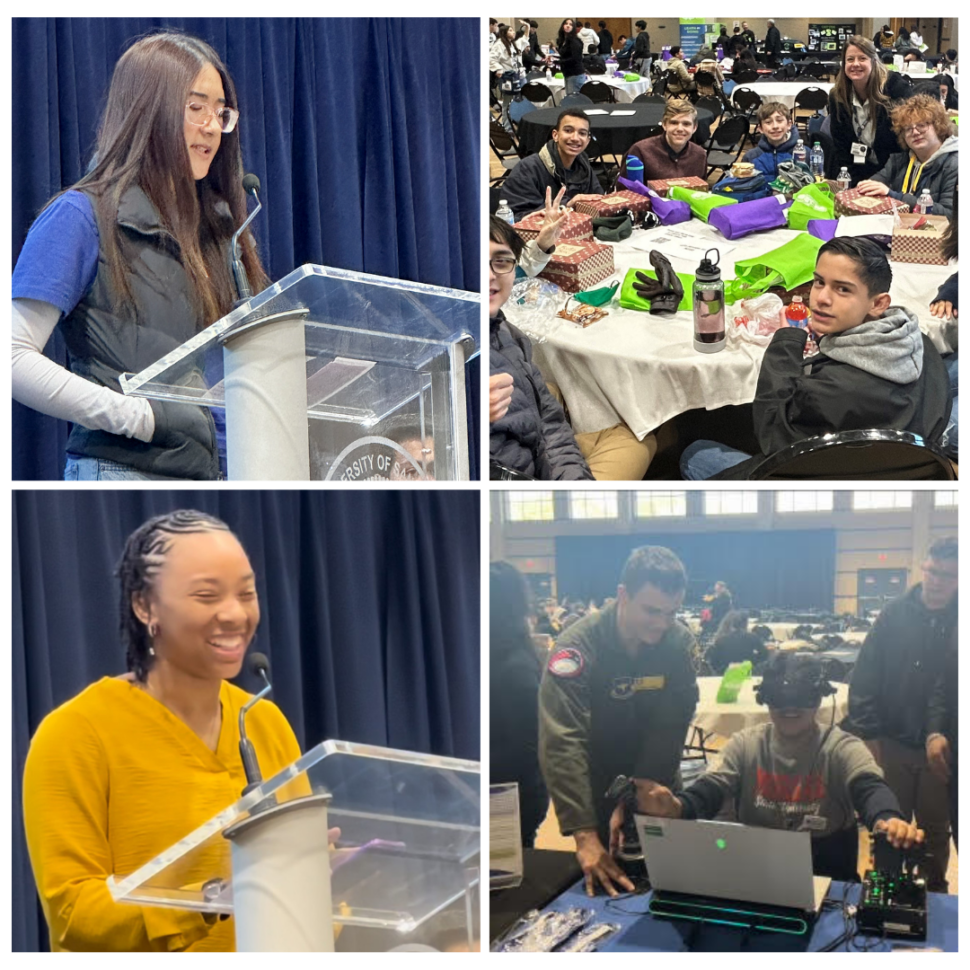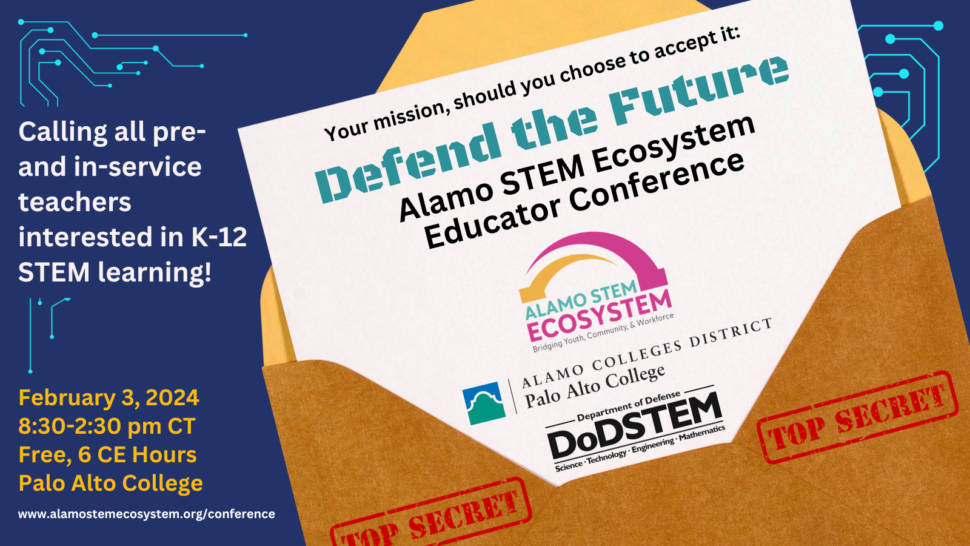• By Stephanie Garcia, Ph.D. • IDRA Newsletter • January 2024 •
More than ever, there is a global priority of preparing students for STEM college and careers with high-quality experiences that increase career awareness and help cultivate relationships, mentorships and work-based experiences.
In 2023, the Defense STEM Education Consortium (DSEC) named the Alamo STEM Ecosystem (ASE) as one of only four STEM Education Hubs in the nation. IDRA co-leads San Antonio’s ASE, which brings together educators, community leaders and industry partners to expand opportunities for K-16 students.

Through this partnership, the Alamo STEM Ecosystem is continuing to provide and scale up meaningful STEM activities for underrepresented students in and around San Antonio and is providing students and educators with exposure to educational and workforce development opportunities as well as awareness about career opportunities in STEM fields.
As part of a consortium, we engage in a national network of partners who seek to advance STEM learning opportunities for historically marginalized students, including students of color, girls, and non-binary students.
Student-Serving STEM Youth Summit (January)
Early this month, we held San Antonio’s first school-day STEM Youth Summit. Our inaugural event took place at St. Mary’s University and was a collaborative effort from all our Alamo STEM Hub leads and ecosystem partners.
Informed by students themselves, the goals for this event were to increase STEM college and career awareness and offer STEM pathway support, connect middle and high school students to local mentors and opportunities through networking sessions, and provide hands-on training in leadership development and STEM learning.
Originally, we aimed to serve 200 to 300 students, but with an overwhelming response from area schools and extra support from sponsors, we were able to increase that number to 400 middle and high school underrepresented students in STEM.
Many additional organizations participated to help impact hundreds of students in their STEM pathways included: BEST Robotics, Cafe College, CAST Schools, Cybersecurity Manufacturing Innovation Institute (CyManII) at the University of Texas at San Antonio, CyberTexas, Dee Howard Foundation, Family Service Association, Girls Inc., Greater SATX, H-E-B, Learning Undefeated, NASA, PREP San Antonio, PTECH, SAMSAT, San Antonio International Airport, TX FAME, the University of Incarnate Word’s GEMS program, UT Health San Antonio, Wex Foundation (LCATS), and Youth Code Jam.
These local and national partners were integral in the youth STEM leadership development day. They led over 20 engaging breakout sessions to prepare students for college and career pathways and position them for success.
Students participated in STEM-focused sessions, including biomedical research, cybersecurity, computer science and AI, robotics, drone aviation, and advanced mathematics.
Leadership and career-focused sessions helped students learn about public speaking, networking, creating a resume that stands out, college admissions and scholarships, and the value of internships and work- and research-based experiences.
Our partner organizations also hosted tables during the STEM Expo rotation so that each partner could network with all 400 students. Partners each provided a flier outlining important things for students to keep in mind as they persist in the rigorous STEM pathway, deadlines for applications, and links to resources.
Before the event, IDRA interviewed a cohort of students to see what they wanted from the STEM Youth Summit. Their top priority was to have information to take back to their families to discuss what they learned together and to take advantage of those resources moving forward.
Students also participated in a St. Mary’s University tour and information sessions that provided a unique experience where students met university faculty and students to learn more about the STEM programs and degrees. Some of these focused on engineering, E-Sports, virtual reality, Earth science, construction management and computer science.
An innovative aspect of our event was incorporating partners through an outdoor learning experience. We invited partners and student leaders to participate by leading STEM demonstrations and bringing mobile STEM labs and simulators to the event. These focus on a variety of STEM topics, such as aviation, biomedical research, and cybersecurity.
This event was possible thanks to IDRA’s DSEC grant and the generosity of St. Mary’s University, one of the ASE’s higher education partners. Other sponsors included the Alamo AFCEA Education Initiative and the many ASE cross-sector partners who served as presenters, table hosts and mentors.
Educator-Serving STEM Educator Conference (February)
The Alamo STEM Ecosystem Educator Conference will take place on February 3, 2024, at Palo Alto College STEM Center (IDRA and SAMSAT are the leads). This is our annual event for San Antonio teachers and pre-service teachers to provide access to and information about innovative and culturally relevant resources for PK-12 teachers through a free, one-day conference designed for teachers at all career stages.
This year’s theme focuses on STEM and career technology education (CTE) pathways, increasing college and career awareness and real-world connections in classrooms, and sharing best practices to serve emergent bilingual students, students with special needs, and underrepresented students in STEM.
We typically serve over 200 educators from San Antonio and offer around 20 engaging, hands-on breakout sessions led by educators and our Alamo STEM Ecosystem partners.
It is not too late for teachers to register for the event at https://idra-resource.center/RegisterASEconference!
Stephanie García, Ph.D., is IDRA’s STEM and gender equity education specialist and directs the IDRA VisionCoders program. Comments and questions may be directed to her via email at stephanie.garcia@idra.org.
[©2024, IDRA. This article originally appeared in the January 2024 edition of the IDRA Newsletter by the Intercultural Development Research Association. Permission to reproduce this article is granted provided the article is reprinted in its entirety and proper credit is given to IDRA and the author.]


